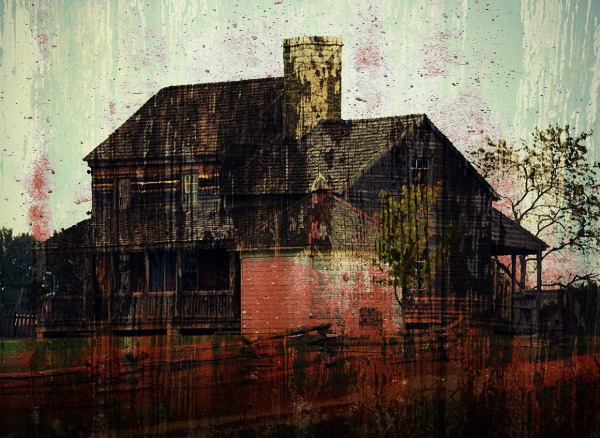Old Donald Had A Farm
 He ate all the pigs first because the Old Testament said he couldn’t. Then he ate the horses, because the Dutch consider it delicacy and he dislikes animals who appear to work harder than him. Eh oh, eh oh, ee. He rounded up the rest in the barn. The heifer was worried her milk would sour when he spoke, so she stood as far from the hay bale podium as possible, tapping her hooves against the flimsy walls. Trump said he wanted to build a better wall, barbed wire and concrete; this is a farm and nobody wants in, explained the goose, so Trump picked him up and threw him in the air. Go back to Canada, he yelled. The goose, over her shoulder, replied, I’m not that kind of Goose, but Trump was already stamping his foot and making animal sounds with his mouth. The best animal sounds. Eh oh, eh oh, ee. A storm murmured outside, softly at first, and then coughing cancer cadence. Water dripped into buckets on the dirt floor. There was a knock on the door. The goats, the gatekeepers, moved to open it up. Trump said, No keep it closed. We have no way of knowing who is out there. The goats brayed. They knew it was the farmer’s son next door who sometimes comes to play on the rusted tractor. They must endure an extensive wetting process first, said Trump. He was wearing leather shoes imported from Peru. The llamas were worried, even though they were born on the farm. Nobody knows where Trump came from. Eh oh, eh oh, ee.
He ate all the pigs first because the Old Testament said he couldn’t. Then he ate the horses, because the Dutch consider it delicacy and he dislikes animals who appear to work harder than him. Eh oh, eh oh, ee. He rounded up the rest in the barn. The heifer was worried her milk would sour when he spoke, so she stood as far from the hay bale podium as possible, tapping her hooves against the flimsy walls. Trump said he wanted to build a better wall, barbed wire and concrete; this is a farm and nobody wants in, explained the goose, so Trump picked him up and threw him in the air. Go back to Canada, he yelled. The goose, over her shoulder, replied, I’m not that kind of Goose, but Trump was already stamping his foot and making animal sounds with his mouth. The best animal sounds. Eh oh, eh oh, ee. A storm murmured outside, softly at first, and then coughing cancer cadence. Water dripped into buckets on the dirt floor. There was a knock on the door. The goats, the gatekeepers, moved to open it up. Trump said, No keep it closed. We have no way of knowing who is out there. The goats brayed. They knew it was the farmer’s son next door who sometimes comes to play on the rusted tractor. They must endure an extensive wetting process first, said Trump. He was wearing leather shoes imported from Peru. The llamas were worried, even though they were born on the farm. Nobody knows where Trump came from. Eh oh, eh oh, ee.
Artist Statement
The political world is absurd right now. Truth has turned into non-Newtonian fluid—solid when settling into the biased brain, and liquid when confronted with repudiating evidence. There is no better case study in the mutability of truth right now than the presidential campaign of Donald Trump, who has somehow, amid his absurdity (or perhaps because of it) amassed a following none but the most cynical would have predicted a year ago. He is profoundly easy to make fun of—the words that leave his mouth are, without exception, nonsensical. And yet he doesn’t care, and neither do his supporters. So he prattles on. Muslims are terrorists. Mexicans are rapists. He could state that Earth is flat and there are lizard people living at its center and none of this would matter. Except it does matter, because when truth degrades, so does the basis of reasoned argument. Feeling becomes a good enough benchmark for policy. He seems to act more like a petulant child than a politician—a narcissistic one to boot. “Old Donald Had A Farm” is my attempt to confront his absurdity—with my own absurdity.
Parables are powerful; they take the recognizable and turn it on its head. Often this is uncomfortable. Anne Sexton, in her book of poems Transformations, took fairy tales and twisted them into not-quite familiar forms, to the effect of exposing the misogyny engendered by the original tales. It is the diffraction of the comfortable that carries power. In “Old Donald Had A Farm,” I take a comforting ditty about the sounds animals make and turn it into a cautionary tale. There is a meeting. There is a rally. The animals are confused, because the inmate has escaped the asylum and set up shop at their farm. Sometimes the only way to confront absurdity is with your own absurdity. It also helps keep you sane. And hopefully it makes you laugh, too.
 Alex Simand holds an MFA from Antioch University Los Angeles. He writes fiction, creative nonfiction, and poetry. His work has appeared in Red Fez, Mudseason Review, Five2One Magazine, Angel City Review, Drunk Monkeys, and others. Alex is the former Blog Editor for Lunch Ticket and past Editor of Creative Nonfiction and Diana Woods Memorial Prize. Find him online at www.alexsimand.com or on Twitter at @AlexSimand.
Alex Simand holds an MFA from Antioch University Los Angeles. He writes fiction, creative nonfiction, and poetry. His work has appeared in Red Fez, Mudseason Review, Five2One Magazine, Angel City Review, Drunk Monkeys, and others. Alex is the former Blog Editor for Lunch Ticket and past Editor of Creative Nonfiction and Diana Woods Memorial Prize. Find him online at www.alexsimand.com or on Twitter at @AlexSimand.
